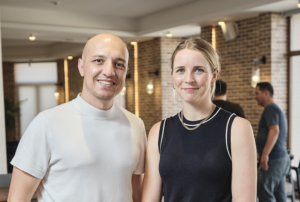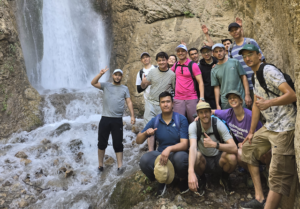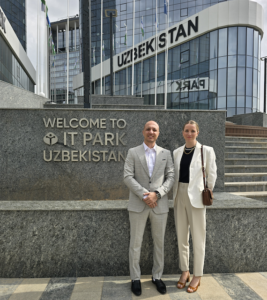Uzbekistan, a former Soviet republic in Central Asia, has only recently emerged as an outsourcing destination. By the end of 2024, the country’s tech exports had grown from virtually nothing to $900 million.
But more than 20 years ago, when Eric Hoopman was searching for tech talent to build DealerFire, a web development firm for automotive dealers, Uzbekistan was still seen mainly as the world’s “cotton province.”
Hoopman connected with his future business partner, Farrukh Umarov, on a freelance marketplace and was immediately impressed by his skills.
“We gave him access to the DealerFire platform, which had previously been developed in Romania,” Hoopman said. “Then we asked if he had a friend… and maybe another friend… and another. That’s how it started. When we visited Uzbekistan, we fell in love with the country — and have been there ever since.”
Within a few years, 50 Uzbek developers had joined the team. Among them was Kadir Fuzaylov, who now co-manages Truss alongside Julia Collins, one of DealerFire’s first U.S. employees. Originally from Samarkand, a Silk Road landmark, he traveled to Tashkent for an interview.

“It was my first job after graduating from university,” Fuzaylov said. “About two years in, Eric invited me to the U.S. for the company Christmas party — it was my first time abroad.”
How companies grow
In 2015, after selling DealerFire, Hoopman brought much of his Uzbek team to the U.S.
Truss, the platform connecting Uzbek tech talent with U.S. companies, grew out of Hoopman’s venture studio — Lincoln Labs — currently uniting 11 brands.
By then, Fuzaylov had moved on to a new role at a major HR tech corporation. Thanks to his initiative, that company became Truss’s first client.
“I said, ‘I know this team, I know the region — let’s give it a try,’” Fuzaylov recalled.
Three years later, the HR company is still a client — and Fuzaylov has since returned, now helping lead Truss from the inside.
Why Uzbekistan?
Uzbekistan offers a unique combination of technical skill, loyalty, and economic incentives.
“They’re offering zero taxes and free office space for IT exporters,” said Fuzaylov. Through the IT Park’s Zero Risk program, companies can get 15% of their annual revenue as cashback.
But these incentives alone don’t explain Truss’s success. The workforce itself — deeply rooted in a culture of hard work and loyalty — is key.
“When we had to meet a deadline, we worked through the night,” Fuzaylov said. “We never asked for overtime. That’s just how we think. It’s part of the Uzbek mindset.”

While Uzbekistan is still a young outsourcing market compared to India or Latin America, its developer pool is rapidly maturing.
“We see a lot of junior and mid-level talent in Uzbekistan, especially in JavaScript, and AI expertise is growing,” Collins said.
Truss runs internal career programs to help developers grow into senior roles, a key move in a market still building depth. “We give challenging tasks and coach them on how to succeed,” Fuzaylov said. “That’s how people grow.”
Building a bridge between worlds
Truss is focused on helping new U.S. companies tap into Uzbekistan.
“We’re making it completely frictionless to hire in this region for clients who don’t want to set up an entity or deal with payroll and tax compliance,” said Julia Collins, Truss co-founder. “We handle everything: contracts, local offices, payments — all of it.”
Fuzaylov sees himself as a cultural translator.
“There are differences — in how we think, behave, do business,” he said.
“My job is to explain Uzbek culture to American clients, and U.S. business expectations to our developers.”

This bridge-building has helped Truss retain clients across leadership changes — a rare feat in outsourced staffing.
“One thing that’s been poignant to me is that leadership changes often threaten vendor relationships,” Collins said.
“But we’ve stayed. We’ve been retained by clients through CTO transitions.”
Truss now employs more than 100 software engineers across client projects, including large enterprises and early-stage startups.
For the latter, Truss often provides more than just developers.
“We helped a young founder in California go from idea to MVP,” Collins said. “He had no technical background. We brought in UI/UX, mobile developers, and even helped build his marketing website through Lincoln Labs support.”
That level of flexibility is especially attractive to startups, which can’t afford Silicon Valley salaries in early stages.
“Imagine launching a product and needing to pay U.S. wages right away,” Fuzaylov said. “It’s just not realistic. That’s why startups look abroad — and we show them Uzbekistan is a great option.”
While “Buy American, Hire American” narrative may be rising in some corners, Truss hasn’t seen a slowdown.
“Outsourcing is a very competitive market,” Collins said. “It’s always been hard to land new clients. But once we do — they stay.”








